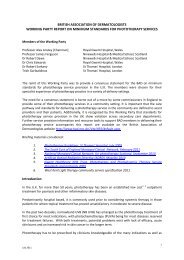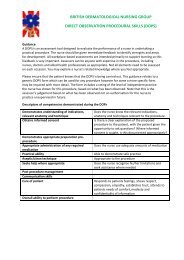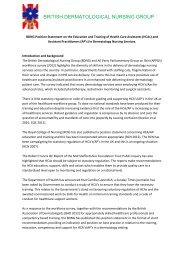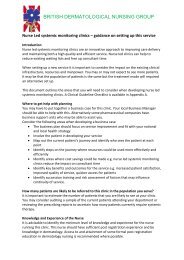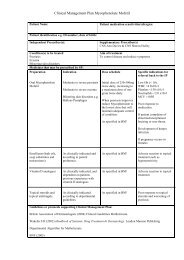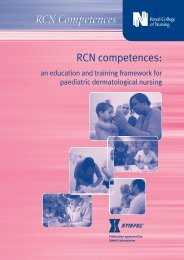Improving outcomes for people with skin tumours including melanoma
Improving outcomes for people with skin tumours including melanoma
Improving outcomes for people with skin tumours including melanoma
You also want an ePaper? Increase the reach of your titles
YUMPU automatically turns print PDFs into web optimized ePapers that Google loves.
<strong>Improving</strong> Outcomes <strong>for</strong><br />
People <strong>with</strong> Skin Tumours<br />
<strong>including</strong> Melanoma<br />
Organisation of <strong>skin</strong><br />
cancer services<br />
Increased concentration of work in the hands of fewer specialists will<br />
improve the expertise of those who see more patients. This is likely<br />
to improve <strong>outcomes</strong> in all groups of patients, but particularly in<br />
those <strong>with</strong> more challenging or rarer <strong>for</strong>ms of <strong>skin</strong> cancer. Staging of<br />
<strong>tumours</strong>, which is essential <strong>for</strong> treatment planning, is more likely to<br />
be accurate when clinicians are more specialised.<br />
Management of patients <strong>with</strong>in these structures will facilitate highquality<br />
audit and research.<br />
C. Evidence<br />
3<br />
Delay in diagnosis<br />
Observational studies are inconsistent in their findings on the<br />
relationship between delay in presentation and the prognostic factors<br />
of <strong>melanoma</strong> <strong>tumours</strong> at diagnosis.<br />
General practitioner<br />
The clinical guidelines issued by NICE (Referral guidelines <strong>for</strong><br />
suspected cancer) make recommendations <strong>for</strong> referral of patients <strong>with</strong><br />
suspected cancer from primary care to specialist services. These<br />
guidelines recommend that patients presenting <strong>with</strong> <strong>skin</strong> lesions<br />
suggestive of <strong>skin</strong> cancer, or in whom a biopsy has been confirmed,<br />
should be referred to a team specialising in <strong>skin</strong> cancer.<br />
Two RCTs demonstrated that provision of training to GPs significantly<br />
improved their ability to diagnose <strong>melanoma</strong> and NMSC, and to<br />
correctly manage patients accordingly. In one trial the training was<br />
delivered via the Internet.<br />
Two RCTs examined the use of a diagnostic algorithm and a camera<br />
as diagnostic tools <strong>for</strong> primary care physicians treating patients <strong>with</strong><br />
pigmented lesions suspicious of <strong>melanoma</strong>. One trial demonstrated a<br />
reduction in the proportion of excised lesions that were found by<br />
pathology to be benign, whereas the other trial found no effect.<br />
One RCT found no evidence that giving feedback to GPs improved<br />
their ability to diagnose and manage <strong>skin</strong> cancer. However, provision<br />
of feedback was associated <strong>with</strong> an improvement in the likelihood of<br />
their <strong>including</strong> a clinical diagnosis when submitting a pathology<br />
request <strong>for</strong>m.<br />
68<br />
National Institute <strong>for</strong> Health and Clinical Excellence




